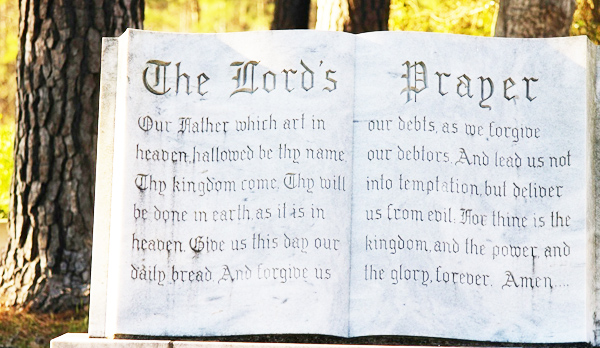Give us each day our daily bread (Luke 11:3). (We continue today in our brief series on the Lord’s Prayer.) The opening requests that Jesus models for us are about God — so like God they are majestic, huge, and inspiring. A lesson Jesus clearly means for us to learn in this prayer is that God comes first, and only when God is first does everything else matter or fall into place. However, the following pleas that Jesus himself places in our mouth are about us — and like us they are daily, mundane, unspectacular.
Christian Living
Is Church Really That Important?
Paul in Ephesians 1:23 describes the church as the body of Christ. And in Ephesians 2:20 Paul goes on to explain that Jesus Christ himself is the cornerstone of the church. As if this were not enough, Paul further insists in Ephesians 3:10 that the manifold wisdom of God is being made known, through the church, to the rulers and authorities in heavenly places. In 1 Timothy 3:15 the church is said to be “a pillar and buttress of the truth.”
Be Careful How You Build
“According to the grace of God given to me, like a skilled master builder I laid a foundation, and someone else is building upon it. Let each one take care how he builds upon it“ (1 Corinthians 3:10). Paul emphasizes over and over again that his labors were “according to the grace of God.” In other words, we can only do what God enables us to do. We are only as strong or skillful or successful as God’s grace working in and through us. Have we been blessed to persevere in Christian service for several years or decades? We are
Walking With the Wise, Forsaking the Foolish
Forsake the foolish, and live; and go in the way of understanding. (Proverbs 9:6) It is interesting how these two things go together: 1) forsaking foolishness, and 2) living wisely. In order to pursue the way of truth, the way of understanding, you must forsake the company of foolish companions. You can’t have both. You can’t go in the way of understanding, and also keep your foolish friends close by. “Forsake the foolish and live,” and in forsaking the foolish, “go in the way of understanding.” To pursue wise ways of living, you must—you must—forsake the company and counsel of
Does Prayer Make a Difference?
David Brainerd observed, “The idea that everything would happen exactly as it does regardless of whether we pray or not is a specter that haunts the minds of many who sincerely profess belief in God. It makes prayer psychologically impossible, replacing it with dead ritual at best.” The answer to the question “Does prayer make a difference?” is definitely, “Yes!”. But let’s consider how and why the Bible teaches us that prayer matters so much.
Why Pray Without Ceasing?
Paul briefly exhorts in 1 Thessalonians 5:17 for believers to “Pray without ceasing.” Yet some of us might ask the question: “Why?” Why pray without ceasing? That seems a tall order for busy people who have many life obligations on their plate already. But consider the biblical inducements to prayer by asking yourself a few clarifying and self-examining questions:
I Shall Not Want
The LORD is my shepherd; I shall not want (Psalm 23:1). In less than ten words the psalmist David expresses the great confidence and sweet security of every believer: first, that Yahweh alone is Lord; second, that he guides and provides for those who put their trust in him; and, finally, that those who are thus cared for shall not want for any good thing.
The Way, the Truth, the Life
Jesus said to him, “I am the way, and the truth, and the life. No one comes to the Father except through me” (John 14:6). Nothing could be more purely practical than this passage, this claim by Jesus! Yes, it is a theological claim, but it should be far more than another point of orthodoxy for us as Christians.
Your Faith, Multiplied
For not only has the word of the Lord sounded forth from you … your faith in God has gone forth everywhere, so that we need not say anything (1 Thessalonians 1:8). Paul, writing to the church at Thessalonica, commends them for their “acoustics.” The message they had received was being reverberated throughout their community, and beyond.
Gain Is Godliness, or Godliness Is Gain?
Godliness with contentment is great gain (1 Timothy 6:6). What do you need right now? What would make you genuinely, blissfully, permanently happy if you just had it right now? Ultimately, the answers to that question fall into one of just two categories: either “gain is godliness” or “godliness is gain.”
The Dangers and Benefits of Revival
Will you not revive us again, that your people may rejoice in you? (Psalm 85:6). We are in desperate need of revival. Our marriages, our families, our churches, our nation (no matter what nation we hail from)—in every arena of life and society and religion we need the omnipotent, renewing visitation of the Holy Spirit. Yet many of us as Christians do not know what “revival” even means precisely.
How Can I Discern God’s Will?
While every decision, whether large or small, is going to have its own distinct set of challenges, there are three basic principles that we should apply in every life situation. This does not mean discerning God’s will always be easy, but God does promise to lead us, in his own good time and way, when we apply these principles faithfully!
Why Fight Sin If Salvation Is Sure?
I discipline my body and keep it under control, lest after preaching to others I myself should be disqualified (1 Corinthians 9:27). Paul, writing to the church at Corinth to correct their problems, confesses that he himself has to be careful to avoid sin. In fact Paul intimates he goes to great lengths — disciplining his body, keeping himself under control — to avoid the pitfalls of willful sin. But why? Did Paul not believe in the perseverance of the saints, or in the eternal security of believers?
There Is Only One Good Fight
Paul tells Timothy to “fight the good fight of faith” (1 Timothy 6:12) and to “wage the good warfare” (1 Timothy 1:18). Clearly conflict is to be part of our Christian life — but conflict with whom or what? We will search the Scriptures in vain for the idea that the conflict is supposed to be with other genuine Christians. It is a conflict with sin, with Satan, and with false doctrine that undermines the fundamentals of the Christian faith.
Apprehension Leads to Application
While knowledge of the truth is very important, it is possible to put so much emphasis on the letter of it that the application is forgotten. Paul reminds us that knowledge alone just puffs a person up, while knowledge according to love actually builds up. So here is a thought for pastors, especially, and by implication the people in the pew as well.














